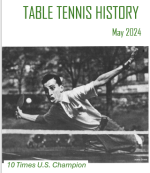This user has no status.
How much training does a young player who is already at a good level (ages 11-12) need if he wants to become a professional?
I know that it varies how much someone can train. And how much someone has to train. And the quality also has to be right.
But what would be the minimum for a talented player to make it? Is it 2-3 hours a day? Training twice a day? How much fitness training at this age?
And what do you think training should be like? A training group with good players and table tennis exercises?
Or would you rather prefer private training and lots of multiball?
I know that it varies how much someone can train. And how much someone has to train. And the quality also has to be right.
But what would be the minimum for a talented player to make it? Is it 2-3 hours a day? Training twice a day? How much fitness training at this age?
And what do you think training should be like? A training group with good players and table tennis exercises?
Or would you rather prefer private training and lots of multiball?










